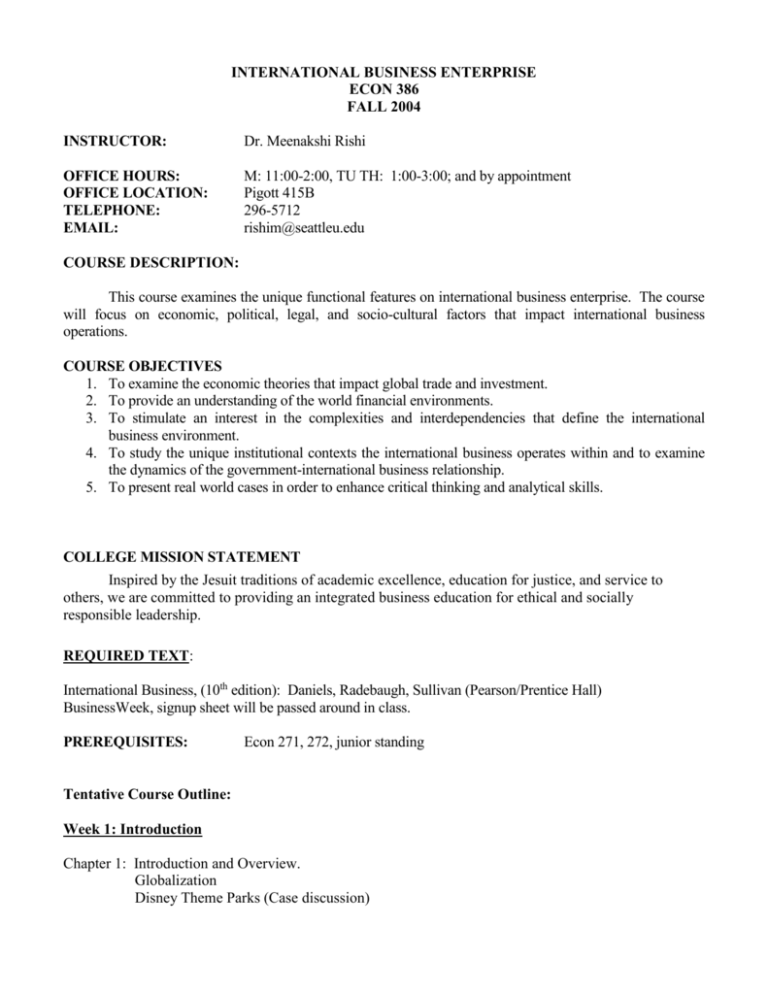
INTERNATIONAL BUSINESS ENTERPRISE
ECON 386
FALL 2004
INSTRUCTOR:
Dr. Meenakshi Rishi
OFFICE HOURS:
OFFICE LOCATION:
TELEPHONE:
EMAIL:
M: 11:00-2:00, TU TH: 1:00-3:00; and by appointment
Pigott 415B
296-5712
rishim@seattleu.edu
COURSE DESCRIPTION:
This course examines the unique functional features on international business enterprise. The course
will focus on economic, political, legal, and socio-cultural factors that impact international business
operations.
COURSE OBJECTIVES
1. To examine the economic theories that impact global trade and investment.
2. To provide an understanding of the world financial environments.
3. To stimulate an interest in the complexities and interdependencies that define the international
business environment.
4. To study the unique institutional contexts the international business operates within and to examine
the dynamics of the government-international business relationship.
5. To present real world cases in order to enhance critical thinking and analytical skills.
COLLEGE MISSION STATEMENT
Inspired by the Jesuit traditions of academic excellence, education for justice, and service to
others, we are committed to providing an integrated business education for ethical and socially
responsible leadership.
REQUIRED TEXT:
International Business, (10th edition): Daniels, Radebaugh, Sullivan (Pearson/Prentice Hall)
BusinessWeek, signup sheet will be passed around in class.
PREREQUISITES:
Econ 271, 272, junior standing
Tentative Course Outline:
Week 1: Introduction
Chapter 1: Introduction and Overview.
Globalization
Disney Theme Parks (Case discussion)
Week 2: The Environment of International Business: Politico-legal, Culture
Chapter 3: Political systems and the legal climate.
Chapter 2: Culture: static reductionism or dynamic evolution.
Latin America (video-based discussion)
Quiz # 1
Week 3: The Economic Environment of International Business
Chapter 4: Economic terminology, country classification, macroeconomic determinants on international
business
Verbal Report week, Homework.
Week 4: Theories and Institutions- Focus on Countries
Chapter 5: International Trade Theory: mercantilism, comparative advantage, factor proportions,
product-lifecycle theory, and country similarity theory
Test 1
Week 5: Theories and Institutions- Focus on Companies
Chapter 5: Degree of dependence, trade policies, the Porter Diamond, role of international business
enterprises in trade.
Verbal Report week
Week 6: International Labor and Capital flows
Chapter 8: Factor mobility, FDI, trade in services (outsourcing)
Rishi and Saxena (2004): Is Outsourcing Really As Bad As It Is Made To Sound? A Re-Assessment And
Some Perspective.
Quiz 2
Week 7: Exchange Rates- Markets, Models
Chapters 9&10: Foreign Exchange markets and instruments, the use of foreign exchange in international
commerce.
Argentina’s Peso crisis (Case-discussion)
Verbal Report week, Homework.
Week 8: Exchange Rates- Systems, Arrangements, Forecasts
Chapters 9&10: The international financial system, exchange rate arrangements, factors affecting
exchange rates
Pakko and Pollard (2003) “Burgernomics: A Big Mac Guide to Purchasing Power Parity,” Federal
Reserve Bank of St. Louis Review, November-December, V 85, Number 6
TEST 2
Week 9: Role of Government –Trade
Chapter 6: Government Influence on Trade: economic and non-economic rationales for governmental
intervention in trade, instruments of trade control
Verbal Report week
QUIZ 3
Week 10: Role of Government -FDI
Chapters 11: Multinational enterprises (MNEs) and their economic impact, the politico-legal impact of
the MNE
FDI in South Africa (case, video-based discussion)
FDI in China (case discussion)
GRADING POLICIES & ATTENDANCE:
There will be three non-cumulative tests (including the Final) and three quizzes during the quarter.
Each quiz is worth 20 points and each Test is worth 40 points. Quizzes are mostly multiple choice and the
tests will combine analytical problems with some multiple choice. Your in-class discussion and
BusinessWeek verbal reports are worth 20 points. The format of these reports will be determined in class.
A percentage will be calculated out of a possible 200 points and letter grades will be assigned on the
following scale,
Percentage
Grade
95-100
A
90-94
A-
85-89
B+
80-84
B
75-79
B-
70-74
C+
67-69
C
65-66
C-
50-64
D
0-49
F
Additionally, individuals may earn brownie (insurance) points by e-mailing short opinion paragraphs to me
[rishim@seattleu.edu]. The paragraph should be able to connect a classroom concept to a “real” world
issue. The real world may be experienced through BusinessWeek, newspaper articles, journals, magazines,
radio, or television. These brownie points will be redeemable (after quiz 3) should there be at most a 2point difference between the student’s current grade and the next higher grade. All insurance points will
be encashed before the final. In other words, you will not have the benefit of insurance after week 10.
No make-up examinations will be offered without approval of the instructor prior to the scheduled
examination date. The exams are going to be mostly based on the portions of the test covered in class
(other readings may be assigned from time to time). In light of this, class attendance becomes an
extremely "rational" decision. Attendance must be in full compliance with p. 36 of the Seattle University
Undergraduate Bulletin of Information. More than two unexcused absences will result in 5 points being
deducted from your grade. With respect to academic honesty, I will religiously enforce the university’s
policy. In case there is some question, plagiarism is considered a form of cheating. Attendance must be
in full compliance with p. 36 of the Seattle University Undergraduate Bulletin of Information. More than
two unexcused absences will result in 5 points being deducted from your grade.
FINAL EXAMINATION:
Tuesday, December 7th, 8:50-9:50 am
DISABILITIES:
Students requiring particular accommodation because of physical and/or learning disabilities
should contact their Dean’s Office prior to the end of the first week of classes.





